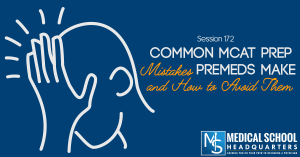
Another great discussion today as we bring in Ken, who is a Princeton Review MCAT instructor and tutor who was a premed himself at one point.
Preparing for the MCAT basically starts the day you set foot on your college campus. Today, we talk about the common mistakes premed students make as they prepare for the MCAT. Hopefully, after hearing this episode, you won’t make these mistakes anymore!
Listen to this podcast episode with the player above, or keep reading for the highlights and takeaway points.
Princeton Review breaks down MCAT questions into 3 types:
Not being familiar with reading articles from scientific journals can be a major disadvantage on the MCAT. We talked about this more in Session 61 of The MCAT Podcast.
Not being familiar with reading scientific journals can be a major disadvantage on the MCAT.Click To TweetOther resources you should be using:
[Related episode: Are There Hidden Prereqs I Should Take for the MCAT?]
[Related episode: How Can I Prepare for and Improve My CARS MCAT Score?]
Studying for the MCAT can be really tough. Find friends that you can study with so you can learn better and stay social, too. One of the best ways to learn the material is to teach the material to someone else.
One of the best ways to learn material for the MCAT is to teach it to someone else in a study group.Click To Tweet
Lorem ipsum dolor sit amet, consectetur adipiscing elit
I just received my admission to XXXXX! This is unreal and almost feels like I am dreaming. I want to thank you for all of your help with my application. I cannot overstate how influential your guidance and insight have been with this result and I am eternally grateful for your support!
IM SO HAPPY!!!! THANK YOU SO MUCH FOR ALL YOUR HELP, IM INDEBTED TO YOU! Truly, thank you so much for all your help. Thank you doesnt do enough.
I want to take a few moments and thank you for all of your very instructive, kind and consistent feedback and support through my applications and it is your wishes, feedback, and most importantly your blessings that have landed me the acceptance!
I got into XXXXX this morning!!!! It still has not hit me that I will be a doctor now!! Thank you for all your help, your words and motivation have brought me to this point.
I wanted to once again express my heartfelt gratitude for your help in providing feedback during my secondary applications. Your guidance has been instrumental in my journey.
Just wanted to share my wonderful news! I received my first medical school acceptance! Thank you for all that you do for us Application Academy!!!
I am excited to tell you that I just got my third interview invite from XXXXX today! I can’t believe it. I didn’t even know if I was good enough to get one, let alone three – by mid-September. Thank you so much for all of your help and support up to this point; I would not be in this position without it!!
I wanted to thank you for helping me prepare for my XXXXX interview. Even in a 30-minute advising session, I learned so much from you. Thank you for believing in me, and here’s to another potential success story from one of your advisees!
I just received an acceptance with XXXXX! This is so exciting and such a huge relief and so nice to have one of our top choice schools! I also received an interview with XXXXX which brings the total up to 20 interviews! Thank so much, none of this would have been possible without you!